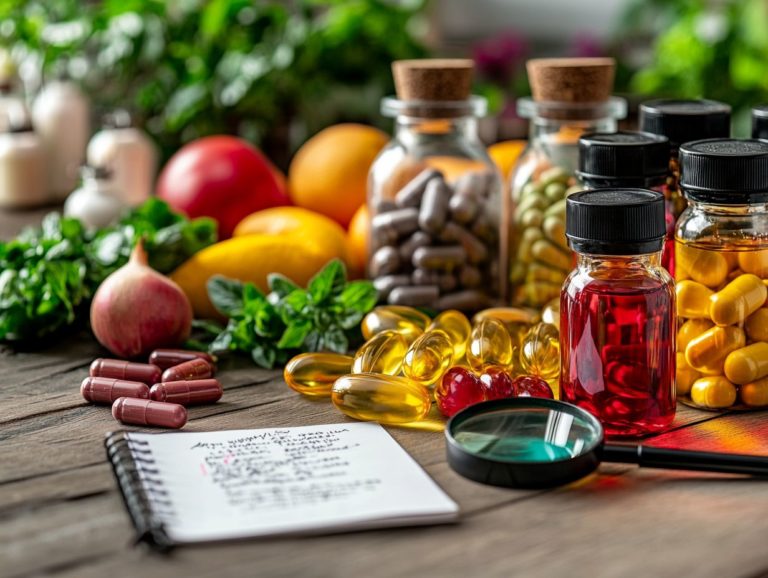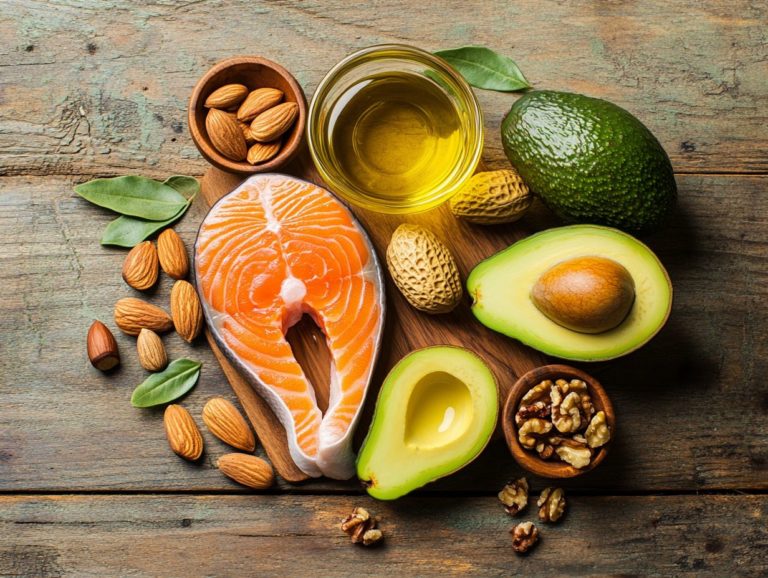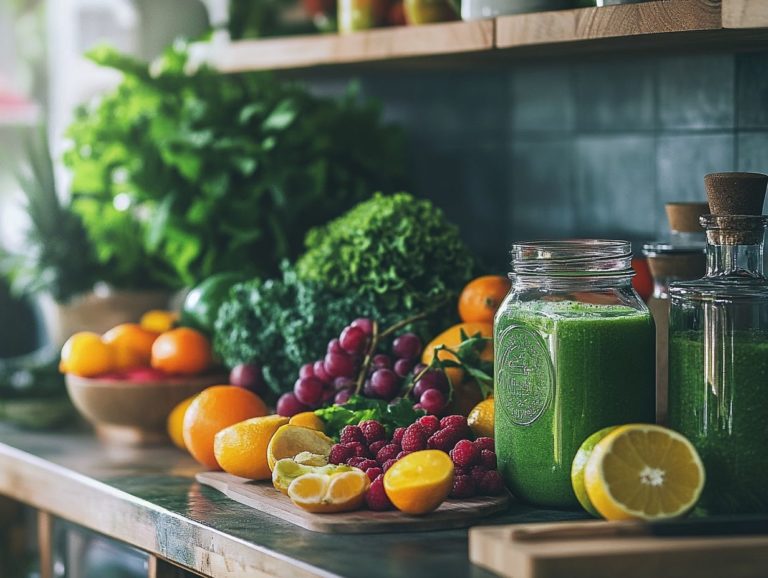Is ‘Natural’ Always Better? The Myths
Today, health and wellness are more important than ever. The term “natural” often takes center stage on product labels and in marketing claims.
But what does “natural” actually mean? This article delves into the definition of natural products, dismantles common myths such as the belief that natural always means safe or superior and sheds light on the regulations and labeling that govern this term.
You ll also discover alternatives to natural products, empowering you to make informed choices in your pursuit of the best options.
Let s uncover the realities behind what “natural” truly signifies.
Contents
Key Takeaways:
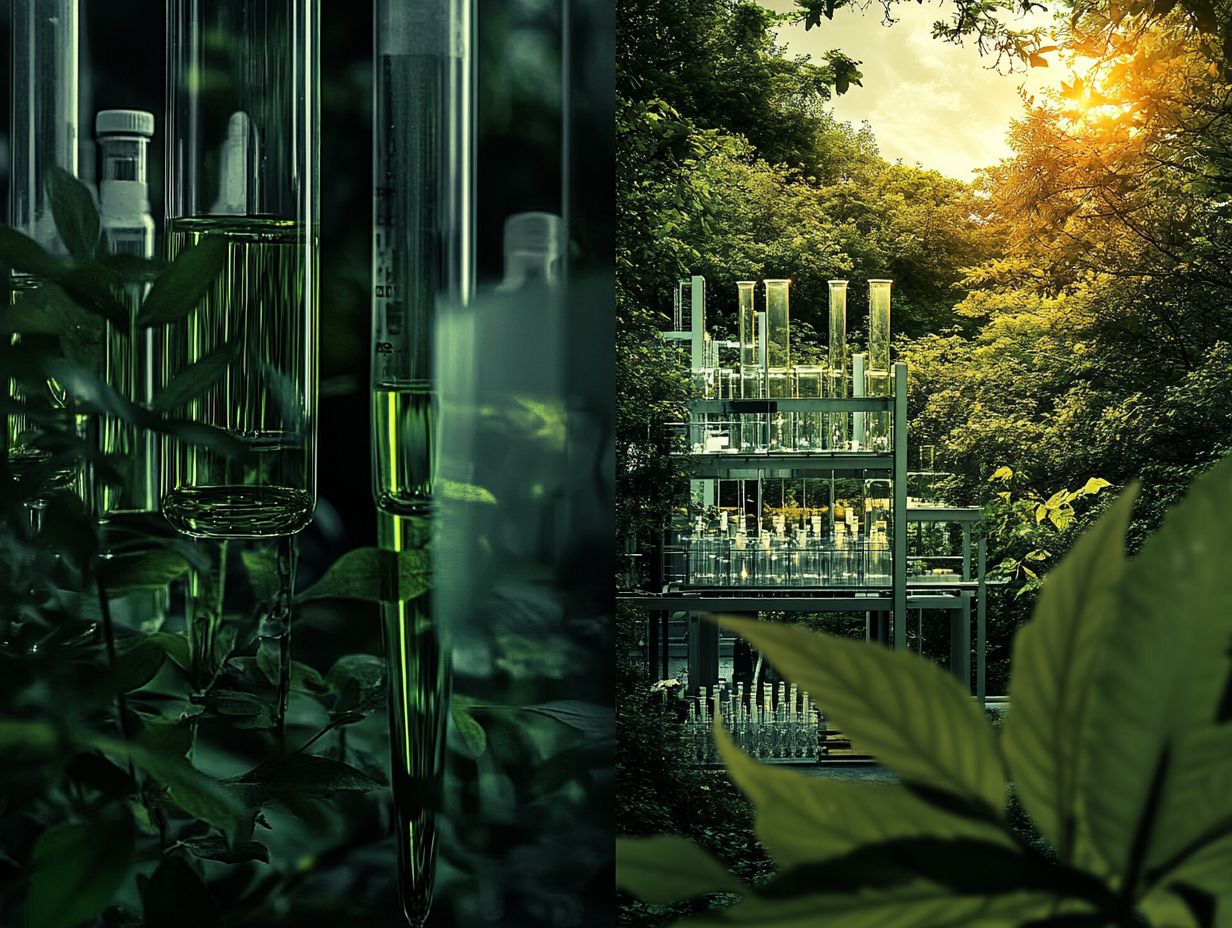
‘Natural’ is a poorly defined term and doesn t always mean safe or superior. The myths surrounding natural products include the belief that they are always better and free from chemicals. Regulations and labeling play a crucial role in determining the safety and efficacy of natural products.
The Definition of ‘Natural’
In the realm of clean beauty, “natural” signifies products made from ingredients sourced from nature. This focus on plant-derived antioxidants and essential oils enhances environmental health and bolsters biodiversity within beauty formulations.
It promises safety and sustainability, resonating with consumers who are drawn to skincare and personal care products that reflect their values of ethical sourcing and effective solutions all while steering clear of harmful chemicals and man-made substances.
Understanding the Term
To grasp the meaning of ‘natural,’ it s essential to explore how various organizations define it and how those definitions impact product labeling in the clean beauty industry. Different agencies interpret ‘natural’ in diverse ways, creating confusion for consumers seeking transparency and authenticity in their choices.
For instance, the Environmental Working Group asserts that products labeled as natural should avoid synthetic ingredients and harmful chemicals. This raises the question: what really qualifies as a natural ingredient, and how can you verify such claims?
Some products, particularly those from brands using ethically sourced plant-based ingredients, adhere closely to these guidelines, showcasing what ‘natural’ should embody. However, you may often encounter items flaunting ‘natural’ labels without a clear breakdown of the ingredients, leading to misconceptions and uncertainty about your choices.
Myths About Natural Products
The myths surrounding natural products can create confusion for you, perpetuating misconceptions that may mislead your purchasing decisions.
This is especially true in the clean beauty sector, where the distinction between natural and synthetic ingredients is often misunderstood.
Myth #1: Natural Means Safe
One prevalent myth is that natural products are inherently safe alternatives to synthetic options. This perspective overlooks the potential health risks and chemical toxicity associated with certain natural substances.
For instance, some individuals experience allergic reactions to natural ingredients like essential oils from plants, such as lavender or tea tree oil. While these oils are celebrated for their therapeutic properties, they can also lead to skin irritations or respiratory issues in those with sensitivities.
In contrast, synthetic ingredients typically undergo rigorous safety testing to evaluate their allergenic potential, giving you the power to make more informed choices. Research, including studies published in the Journal of Allergy and Clinical Immunology, has examined the safety profiles of both natural and artificial ingredients, revealing that certain natural compounds can be more hazardous than their synthetic counterparts.
This underscores the importance of critically evaluating both options, reminding you that ‘natural’ does not always equate to ‘safe.’
Myth #2: Natural Products are Always Better
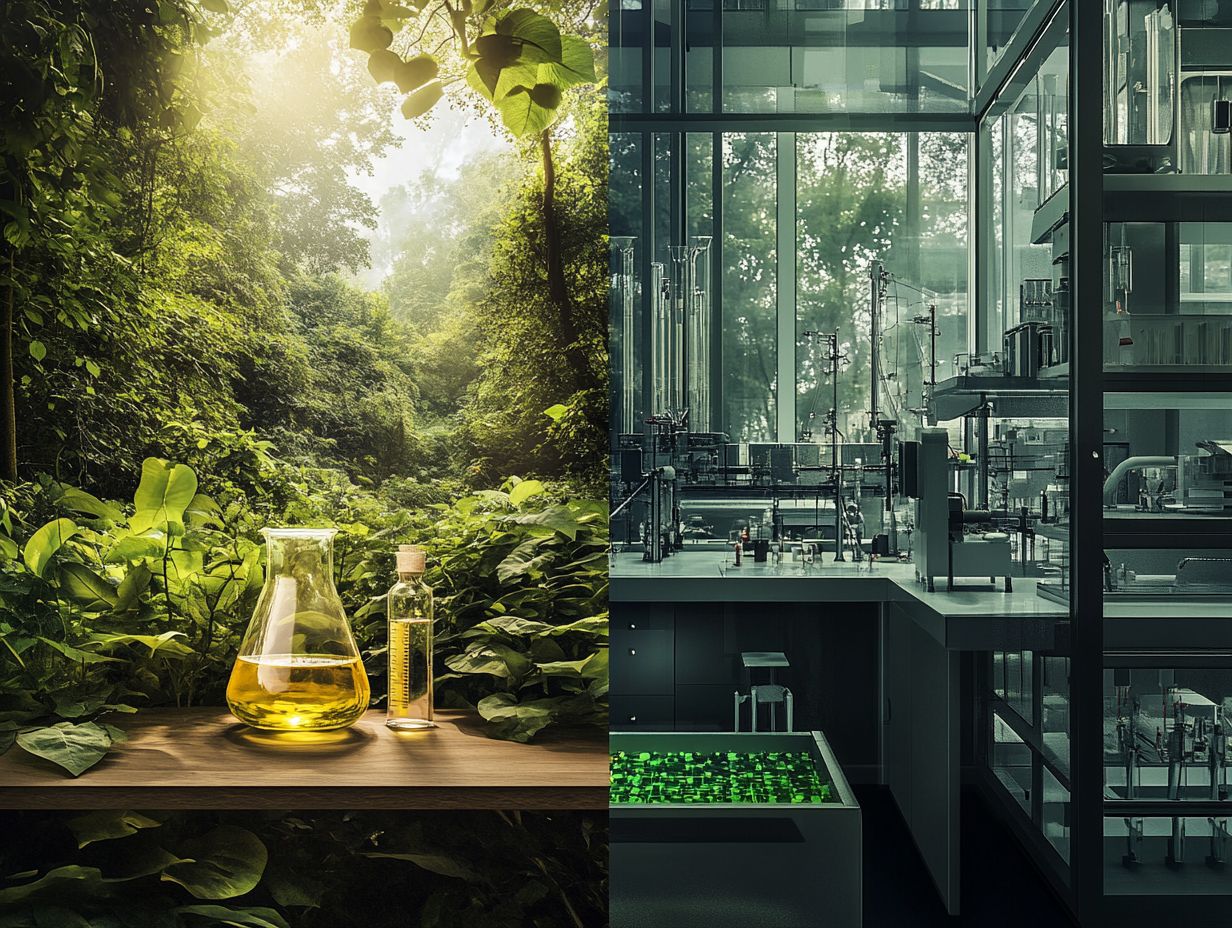
Many believe natural products are better than synthetic ones. This belief can make you miss out on effective solutions using advanced green chemistry and ingredients that are very similar to those found in nature.
Consider this: many contemporary skincare formulations now feature man-made compounds that mimic natural proteins and hyaluronic acid. Both of these offer remarkable hydration and impressive safety profiles. These advancements show how innovation can provide meaningful alternatives that compete with traditional ingredients.
Sustainably sourced compounds, like plant-derived squalane, moisturize effectively and are ethically harvested. Make your health a priority! Choose products that work well and are ethically sourced.
By doing so, you ensure your investments promise outstanding performance and a commitment to responsible formulation.
Myth #3: Natural Products are Chemical-Free
The idea that natural products are completely free of chemicals is a misconception. All products, no matter their source, have a chemical composition.
In reality, both natural and synthetic items consist of various chemical substances that can influence their effectiveness and safety. Many consumers believe that synthetic chemicals are harmful while ignoring that naturally derived ingredients can also have powerful compounds that might cause adverse effects.
By acknowledging the benefits of certain chemicals, especially in beauty formulations like botanical extracts and plant-derived antioxidants, you can make more informed choices about what to apply to your skin.
Highlighting the positive roles these ingredients play in promoting health and beauty can reshape the conversation and deepen your appreciation for the science behind cosmetic products.
The Truth About Natural Products
The reality of natural products is shaped by regulatory frameworks and labeling practices that help you understand the efficacy and safety of herbal remedies and clean beauty formulations.
In a landscape filled with consumer confusion, these guidelines serve as your compass, helping you navigate the complex world of wellness and beauty confidently.
Regulations and Labeling
Regulations surrounding product labeling in the clean beauty sector address safety concerns and provide clear information about the ingredients and sourcing of your skincare products.
These regulations also enhance transparency and foster trust among discerning buyers who scrutinize the contents of their beauty items.
When comparing this to countries like the United States and those in the European Union, you’ll notice differing standards that influence product labeling and marketing. For instance, the EU enforces stricter regulations on ingredient safety and bans many harmful substances, whereas the U.S. allows a broader range of chemicals.
This disparity can leave you feeling perplexed about what constitutes a safe and ethical product. As a result, many are gravitating towards brands that adhere to rigorous standards and prioritize ethically sourced ingredients.
This shift shapes your purchasing decisions and drives the market toward cleaner alternatives.
Alternatives to Natural Products
While natural products capture your attention, consider the many synthetic and artificial options available. These alternatives often provide effective treatments, supported by rigorous chemical analysis and stringent testing standards.
Explore your options and discover what truly works for your skin today!
Synthetic and Artificial Options

Synthetic products often deliver effective treatments that adhere to rigorous standards, sometimes offering more affordable alternatives to their natural counterparts. However, it s crucial to remain aware of the potential health risks they may carry.
With a vast selection of synthetic formulations available from moisturizers to targeted treatments their roles in skincare can be both advantageous and complex. Research indicates that many of these products undergo thorough testing for safety and potency, providing solutions for issues such as acne, uneven skin tone, and signs of aging.
Distinguishing credible scientific data from common myths can be challenging. Therefore, it’s wise to explore ingredient lists and delve into clinical studies, ensuring your skincare choices are well-informed. This approach promotes efficacy while prioritizing safety.
By making educated decisions, you can achieve better results without compromising your skin’s health.
Making Informed Choices
Understanding essential factors like safety, ingredient transparency, and the effectiveness of both natural and synthetic products empowers you to meet your needs and make decisions that align with your values.
Factors to Consider When Choosing Products
When selecting products, consider various factors such as effectiveness, safety concerns related to harmful effects of chemicals, and product labeling clarity. This will help you choose clean beauty products confidently.
It s also essential to dig deeper into ingredient sourcing. Ensure that the components of your favorite products originate from sustainable practices and ethically sourced origins. This commitment to transparency enhances your trust as a consumer and supports brands reflecting your values.
Certifications from independent organizations can provide invaluable assurance regarding product integrity and safety.
If you have any potential allergies, it’s crucial to verify ingredient lists to avoid negative reactions. This shows how important it is to be a responsible consumer in the burgeoning clean beauty industry.
Frequently Asked Questions
Is Natural Always Better?
Many believe natural products are always the best choice, but that’s not the whole story. While natural options can have benefits, myths about their superiority exist.
What are the common myths surrounding natural products?

One common myth is that natural products are always safer than synthetic options. This isn’t necessarily true, as some natural ingredients can still cause allergic responses or interact with medications. Another myth is that natural always means organic, but there are no regulations on the use of the term natural .
Are natural products always more effective?
Not necessarily. While natural ingredients may offer benefits, they may not always be as effective as man-made alternatives. For example, a natural remedy for acne may not work as well as a prescription medication.
Are natural products always better for the environment?
It s true that natural ingredients are often better for the environment, as they are biodegradable and don t contain harmful chemicals. However, the production of some natural products can still negatively impact the environment, such as deforestation for harvesting ingredients.
Are there any risks associated with using natural products?
Yes, there can be risks associated with using natural products. Some natural ingredients may cause allergic reactions or interact with medications. It s important to research and consult with a healthcare professional before using any natural products.
Should I completely avoid natural products?
No, natural products can still offer benefits and may be preferred by some individuals. It s important to do your research and consider potential risks before incorporating natural products into your routine.


